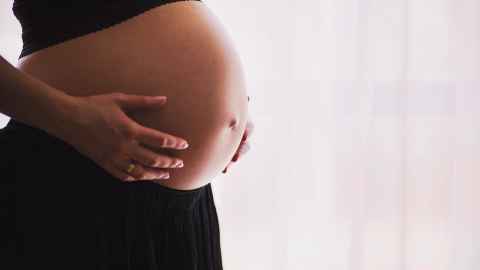Sharp increase in stillbirth risk if baby quiet in evening
12 July 2019
Pregnant women who notice their baby is less active than usual in the evenings should call their lead maternity carer straight away.

The advice comes after a finding from a New Zealand study that women who reported their babies were ‘quiet’ in the evening, with light or no movement, had an almost four times’ greater risk of stillbirth compared to women with nocturnally active babies.
“Some women put off contacting their midwife in the evening as they think it’s inconvenient and don’t want to seem over-anxious,” says lead author, Billie Bradford, a PhD student in the University of Auckland’s Faculty of Medical and Health Sciences and a practicing midwife based in Wellington. “But, delays in women presenting with fetal movement concerns have been linked to complications including stillbirth in other studies.
“All babies have some quiet times and some active times, but the evening is normally an active time, so if the baby doesn’t have moderate or strong movements at that time like they normally would, a check-up is needed. In most cases, this will provide reassurance that the baby is doing okay, although some women may need a follow-up scan or closer monitoring.”
We advise pregnant women to trust their gut, if they really feel something is wrong with their baby’s movements, get a check-up, it may make all the difference
Stillbirth is defined as the loss of a baby after 20 weeks of pregnancy, and many stillbirths are thought to be preventable. An estimated 2.64 million babies die before birth globally each year, including around 300 babies in Aotearoa New Zealand. About one in every 500 women in New Zealand will experience a late stillbirth, losing her baby at or after 28 weeks of pregnancy.
“Stillbirth is incredibly traumatic for families, and we felt there was potential to prevent some stillbirths if fetal movement was better understood,” says Mrs Bradford. “We knew from other studies that women felt more movements in the evening, but we weren’t sure how relevant this was to stillbirth.”
Researchers interviewed 164 women who had recently experienced a late stillbirth and asked them what their baby’s movements had been like in the two weeks before the baby died. Around half of those women had lost their baby at 37 weeks or later.
For each stillbirth, three or four women at the same stage of pregnancy and from the same part of the country were also interviewed (569 controls in total). Responses were then analysed to see what was different in the pregnancies where the baby had died, compared to the ongoing pregnancies.
The findings, published in the high-ranking journal Scientific Reports, confirmed that decreased frequency and decreased strength of baby movements were linked to stillbirth. Most strikingly, for babies who had quiet or light movement in the evening, stillbirth risk increased by nearly fourfold (3.82 times).

“The good news for pregnant women is that feeling moderate or strong fetal movements in the evening is very reassuring of a healthy baby. Feeling groups of strong movements and baby hiccups is also a good sign.”
A recent study by the same team described a ‘new normal’ for baby movements: a 24-hour pattern in which babies are more active in the evening and at bedtime, with movements often getting stronger as babies come to term.
Senior author, University of Auckland Professor Lesley McCowan, says the latest findings raise the question of whether fetal movement screening and monitoring in tune with babies’ 24-hour pattern of activity might help prevent stillbirths.
“Medical researchers are looking at ways to improve treatment outcomes in many areas by taking into account circadian rhythms. A ground-breaking 2017 study found that open heart surgery was more successful when it was conducted in the afternoon instead of the morning, all other things being equal, due to syncing with circadian rhythms. We need more studies to investigate whether evening fetal movement screening and assessment may help prevent stillbirths,” says Professor McCowan, head of the University’s Department of Obstetrics and Gynaecology.
The research team, which also included a researcher from the University-based Liggins Institute, is now looking at fetal movement patterns in women at raised risk for stillbirth, such as women with obesity and women whose babies are not growing well in the womb.
For now, the message for pregnant women is clear. Mrs Bradford: “We advise pregnant women to trust their gut, if they really feel something is wrong with their baby’s movements, get a check-up, it may make all the difference.”
Read the article:
Scientific Reports: Associations between maternally perceived quality and pattern of fetal movements and stillbirth
Media contact
Nicola Shepheard | Media Adviser
Tel: +64 9 923 1515
Mob: +64 27 537 1919
Email: n.shepheard@auckland.ac.nz